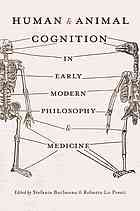

Most ebook files are in PDF format, so you can easily read them using various software such as Foxit Reader or directly on the Google Chrome browser.
Some ebook files are released by publishers in other formats such as .awz, .mobi, .epub, .fb2, etc. You may need to install specific software to read these formats on mobile/PC, such as Calibre.
Please read the tutorial at this link: https://ebookbell.com/faq
We offer FREE conversion to the popular formats you request; however, this may take some time. Therefore, right after payment, please email us, and we will try to provide the service as quickly as possible.
For some exceptional file formats or broken links (if any), please refrain from opening any disputes. Instead, email us first, and we will try to assist within a maximum of 6 hours.
EbookBell Team

4.3
28 reviewsFrom the sixteenth to the eighteenth century, new
anatomical investigations of the brain and the nervous system, together
with a renewed interest in comparative anatomy, allowed doctors and
philosophers to ground their theories on sense perception, the emergence
of human intelligence, and the soul/body relationship in modern
science. They investigated the anatomical structures and the
physiological processes underlying the rise, differentiation, and
articulation of human cognitive activities, and looked for the
“anatomical roots” of the specificity of human intelligence when
compared to other forms of animal sensibility.
This edited volume focuses on medical and philosophical debates on
human intelligence and animal perception in the early modern age,
providing fresh insights into the influence of medical discourse on the
rise of modern philosophical anthropology. Contributions from
distinguished historians of philosophy and medicine focus on
sixteenth-century zoological, psychological, and embryological
discourses on man; the impact of mechanism and comparative anatomy on
philosophical conceptions of body and soul; and the key status of
sensibility in the medical and philosophical enlightenment.